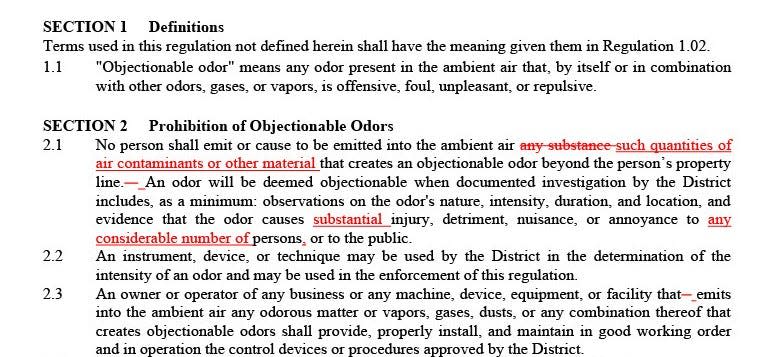Louisville just relaxed its odor rules. Air quality leaders say there's a reason for that
The Air Pollution Control District board unanimously approved revisions to Louisville's objectionable odor regulations on Wednesday that appear to loosen restrictions.
The changes come as "part of a mediation with Swift Pork Company regarding alleged violations of this Regulation," according to APCD.
Swift, which operates a pork plant in Butchertown, supports the revisions. The company is responsible for a trend of odor complaints over the years and has a history of odor noncompliance.
The handful of added words in the regulation narrow the definition of "objectionable odors."
Here's more:
For subscribers: Fed-up Butchertown neighbors sick of pork plant stench file class-action lawsuit
How will Louisville's odor regulations change?
Wednesday's approved revisions are effective immediately, and apply to the entire city, from residents to corporations.
The addition of words like "substantial" narrow the definition of objectionable odors. That's in an effort to more closely align Louisville's odor rules with state statutes, and would not weaken the community's ability to confront corporate odor emitters, according to APCD.

Most odor complaints the district receives describe serious issues, and would still meet the standard of "objectionable" under the new regulation, APCD director Rachael Hamilton said earlier this year. The district has also said the changes will not affect its enforcement practices.
Changes to several other regulations were also on the table Wednesday, but the changes to odor rules had received particular interest from the community, according to APCD officials, who had solicited public comment on the changes for months. Members of the community expressed concern about the apparent narrowing of language in the odor rules at a public meeting in January.
Randy Strobo, an environmental lawyer in Louisville, said the changes could end up giving more flexibility to polluters to push the envelope on odor emissions.
"'Substantial' is problematic for me, from an enforcement perspective,” Strobo said. “You don’t want to wait until it's substantial. You don’t want it to occur at all.”
Why is APCD changing odor regulations?
By matching state statute and using more specific language in odor regulation, the regulations could hold up better in court and enforcement, according to APCD officials. The Jefferson County attorney's office also recommended making the changes.
The district's reconsideration of odor regulations came out of litigation with Swift over violations. But APCD officials said the company had no part in writing the revisions, and that the board was not bound by those legal mediations to approve the changes.
JBS, Swift's parent company, did not immediately return requests for comment on the regulation changes.
What is the extent of Louisville's issues with odor?
Swift's Butchertown pork plant consistently generates odor complaints year after year, data shows, and has been the subject of legal action both from APCD and the public.
Additionally, the Metropolitan Sewer District is spending millions of dollars each year to tackle its sewer odor problems, which have inundated West End neighborhoods and resulted in a notice of violation from APCD. Sewer odors, an indicator of toxic hydrogen sulfide, flared up most recently in September.
Background:Decades later and millions of dollars spent, why does Louisville's sewer odor persist?
Community members have also expressed fears about chemical smells, particularly in the neighborhoods near the Rubbertown industrial area, and what these smells could mean for the safety of the air they breathe.
Connor Giffin is an environmental reporter for The Courier Journal and a corps member with Report for America, a national service program that places journalists in local newsrooms to report on under-covered issues. The program funds up to half of corps members’ salaries, but requires a portion also be raised through local community fundraising. To support local environmental reporting in Kentucky, tax-deductible donations can be made at courier-journal.com/RFA.
Learn more about RFA at reportforamerica.org. Reach Connor directly at cgiffin@gannett.com or on Twitter @byconnorgiffin.
This article originally appeared on Louisville Courier Journal: Louisville relaxes language in regulation to police foul odors in city

